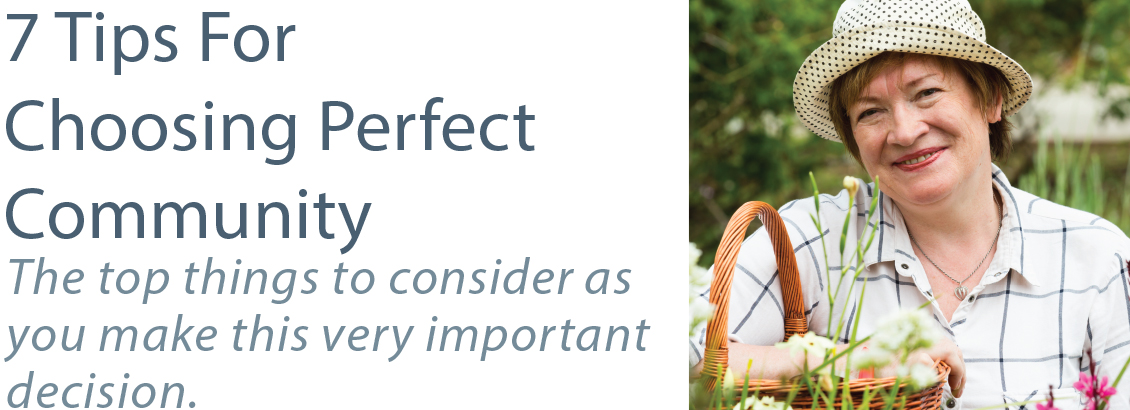Insights | Blogs

Throughout your life as you have chosen where to live, you have based your decisions on a variety of factors. Location was always important. Community amenities, too. You also hoped to like your neighbors and feel safe. As you grow older, it becomes more apparent that the decision of where to live after retirement comes with even more considerations. And if a move to a retirement community that offers continuing care is something you’re debating, you have even more to think about. Putting thought into these things is an essential part of making the right choice – so we’re here to help guide you through the top things to consider as you make this very important decision.
What to Consider
Before you start looking, it is important to know what you want to accomplish by making the move. Here are some top considerations:
- Family Proximity: How close to your children or relatives would you like to live? Many older adults plan to stay in their current neighborhood, while others are more willing to make a move to be closer to family.
- Retirement Community Options: Senior living facilities come in all shapes and sizes. Some have large common areas with various amenities and activities, while other focus more on private, spacious residences or offer stand-alone villas with support staff close by, but no onsite personal care assistance.
- Level of Care: Senior living facilities vary widely in the type of care and living services they provide, ranging from providing independent retirement living, assisted living, memory care and rehabilitation or skilled nursing. Some are simply communities for those age 55 and up that feature private individual housing with limited amenities like yard maintenance. Others may only support independent living with limited staff. Other communities, called Continuing Care Retirement Communities (CCRCs), also referred to as Life Plan Communities, offer a whole spectrum of care all on one campus. The spectrum of care offered is an important consideration because if a community does not provide higher levels of care, residents ultimately may need to move to another community where their increasing level of need can be properly met. This is particularly important for couples who might end up being separated because one partner needs more support than the other.
- Cost: While there is a monthly fee for each senior living community, what is included in that fee may vary. Some charge for services such as laundry and housekeeping, while others are all-inclusive. Some require a substantial deposit upfront while others do not. Be sure to ask what happens if you should run out of money while living in senior accommodations. Some communities might ask you to move out, while others (namely non-profits) will continue to provide care to residents who outlive their assets.
- Key Characteristics: What kind of amenities and events do you want to have? Knowing the answer will make it much easier to select the right community. For instance, if you are someone who enjoys joining book clubs, attending wine tastings, and regular exercise classes, a larger senior living community with an expansive activity calendar would work best for you. If you prefer a quiet atmosphere with just a few neighbors and would prefer sharing common living spaces, then a group home might be a better fit.
- Transportation: How are you planning to get around? Most communities offer transportation to and from doctor’s appointments, while others have regularly scheduled shopping busses and group transportation to entertainment offsite. If you are still driving, inquire about availability and cost of parking. Some may offer valets or reserved covered parking in the community, while others cannot make those accommodations or simply do not provide for resident parking
- Faith-Based Senior Living: Most communities are open to people of all faiths. If you would like to live in a faith-based environment, you’ll find that some senior living facilities offer pastoral care, including onsite worship services, chapels, study groups, and staff chaplains. The spiritual life of some can be an important part of maintaining a vibrant and purposeful lifestyle.
Once you’ve made your decisions about these factors, then it is time to schedule a tour or virtual visit to see the type of retirement community environment that most interests you. Come prepared with a list of questions or a checklist of services and amenities you would like to see when you’re touring. This will make it easier for you when determining which retirement community environment is right for you.

About Brazos Towers:
Brazos Towers at Bayou Manor has been Houston’s most trusted non-profit retirement community since 1963. Here, seniors receive all the support services they might ever need: Independent Living, Assisted Living, Memory Care, Skilled Nursing and Rehabilitation. This environment focuses on experiencing the most freedom, interesting engagement and personal independence possible, regardless of one’s capabilities.
About the Author, Michelle Watkins:
As Retirement Counselor, Michelle helps seniors successfully navigate their choices by better understanding the differences between communities and the services they offer.
Contact her at 713-660-5033 to schedule your complimentary retirement planning consultation or email michelle.watkins@houstonretirement.org.







